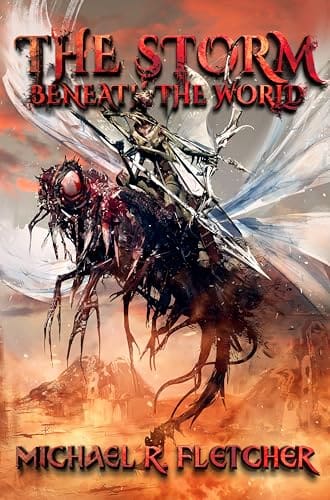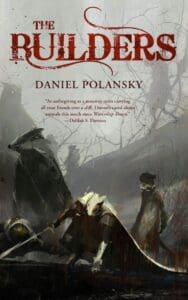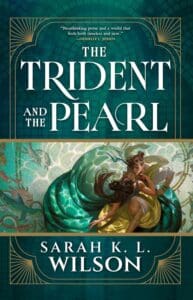
We’re going to need a bigger fly swatter
Synopsis
Cursed by the gods, the insectile ashkaro live on flying islands travelling the eternal River of Days while a hellish firestorm devours the world below. Collected into queendoms, the higher caste brights live in the luxurious windward rain-forest while the servile dulls scrape out a desperate existence in the leeward desert. Conflicts escalate between two neighbouring queendoms. Where Nysh embraces modern ideals of equality and independence, Yil honours the Fallen Goddess by enslaving their neighbours and maintaining traditional castes. In preparation for the imminent war, Nysh sends ashkaro youths with dangerous Talents to secret schools, training them as assassins and spies. Joh, a dull male with a Talent for suggestion, and Ahk, a bright female with a Talent for stealth, are torn from their families and thrown into the academy. The two naively believe that the biggest threat comes from the other students, not realizing the war has already begun. United in purpose, divided by caste, they can only save the island from the Mad Queen by working together.
Review
Over many books and multiple series, Michael R. Fletcher has weaved his unique (grim)dark tales and built a stellar fantasy rep as a result. One of Fletcher’s defining traits is his mad genius approach to the central ideas in his books. For example, in the decade since the first book in his Manifest Delusions series was published, has there honestly been a better magic system than one where reality is defined by someone’s insane beliefs? That’s rhetorical, don’t send me better ideas. Original worldbuilding is also another strong motif of Fletcher’s.
Both these traits are on wild display in The Storm Beneath The World, the first in his new series, and a book that showcases the depths of Fletcher’s inspired and at times depraved skillset.
Here we have a society of people-sized insects who inhabit a giant island. The first worldbuilding trick is that Fletcher has eschewed the standard hive society of insect worlds for a more individualised society but also clearly a caste system, the detail of which is glorious to behold. There’s the dulls – the dregs of society so named for the dull colours of their carapace (insect shell). The higher up in the society you go, the brighter coloured your carapace is – hence the brights. A naming system also reflects this hierarchy; dulls have one-word names and the highest of the brights have a frankly arrogant five names. Oh, and it’s a gender-flipped world: Fletcher has enormous fun imagining a society where men are the ones put upon and females are the ruling, intelligent, bloodthirsty warriors.
This insectoid caste system is intricately woven so after a while it stops being bizarre that you’re in a world of essentially big praying mantises and you can start focusing on the detail. Not that you ever forget they’re insects; Fletcher has thought hard about their physiology and nowhere is this clearer than in the standard Fletcher violence; there’s something deeply and absorbingly grim about learning the biological truths about these insects’ bodies through the ultra-violent scenes of their various body parts being torn off and one particularly nauseous torture scene which won’t be forgotten quickly or, perhaps, ever.
As for his standard mad magic idea; here we have the idea of talents, and the corrupted. Everyone has a hidden talent (i.e. super power); but if you discover yours, then you become the corrupted and without strong training will ultimately give into the “lure”. In other words, if you’re good at burning people with your mind, then if you’re not careful the whole world will burn and you’ll have to be killed. It’s a gloriously dark take on super heroes – never has magic had such a dire cost – and also to my mind offers an interesting meta take on creativity. We know that mental health is often innately tied to creativity (how many tortured artists of history have proved this), so how far are we writers ever from succumbing to our own lures? (maybe file that under bizarre reader takes, whatever).
All this worldbuilding never overwhelms though, as Fletcher has given us four POVs of these so-called corrupted, all from various castes, whose class struggles and even greater “oh shit now I’m one of the insect X-men” struggles are immensely engaging. The plot focuses on them all being brought to the X-men Academy, sorry, training schools, where they will be trained to fight for the Queen of the Island against the “Mad” Queen of the enemy island – or else fall to the temptations of their powers with the inevitable messy endings this will lead to.
What follows is peak Fletcher: bloody, grim, violent fights; close character study, and last but not least big meaty themes. Is these insects’ caste society of alleged individualism really better than the collective hive society of the “enemy” they are being trained to fight? Who is the real enemy here? Does any of it really matter, or do you just cling to your friends and let the rest burn? Fletcher is one of the best at mixing existentialist philosophy with characters having objects violently shoved through various parts of their body, and he is on fire here.
Fletcher has also crafted a mysterious world beyond the borders of the single giant island – rumours of pirate islands, islands where insects have devolved back to hive, and entire new worlds and races hidden behind supposedly impassable walls of storms. This is one of my favourite things about fantasy; bizarre snippets of undiscovered lands, the HERE BE DRAGONS of the map, and Fletcher is great at this. Epigraphs are used to good effect; often lazy in some books, here they are fascinating in the insight they offer into insect society but also the manifold mysteries Fletcher has laced within this world that we better get answers to… or else. (Else what? Shut up).
As we race to the climax of the novel, Fletcher raises the stakes for all four of our carapaced assassins and dives into some dark character territory as the horrific potential of their powers comes to the fore. He then ends on the kind of massive cliffhanger characteristic of a canny author who wants you to salivate for the second book.
In summary, the Mad Titan of dark fantasy has done it again… this is an inspired take on the dark side of super powers combined with stunning worldbuilding, grimly satisfying action and compelling character arcs. Fletcher’s complex insectoid society feels more stunningly real than most human fantasy ones. A joy.







Leave a Reply